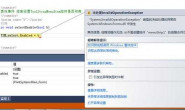|
10分 |
仅供参考:
#include <stdio.h>
#include <stdlib.h>
#include <string.h>
#ifdef WIN32
#include <windows.h>
#include <io.h>
#else
#include <unistd.h>
#include <sys/time.h>
#include <pthread.h>
#define CRITICAL_SECTION pthread_mutex_t
#define _vsnprintf vsnprintf
#endif
//Log{
#define MAXLOGSIZE 20000000
#define MAXLINSIZE 16000
#include <time.h>
#include <sys/timeb.h>
#include <stdarg.h>
char logfilename1[]="MyLog1.log";
char logfilename2[]="MyLog2.log";
static char logstr[MAXLINSIZE+1];
char datestr[16];
char timestr[16];
char mss[4];
CRITICAL_SECTION cs_log;
FILE *flog;
#ifdef WIN32
void Lock(CRITICAL_SECTION *l) {
EnterCriticalSection(l);
}
void Unlock(CRITICAL_SECTION *l) {
LeaveCriticalSection(l);
}
#else
void Lock(CRITICAL_SECTION *l) {
pthread_mutex_lock(l);
}
void Unlock(CRITICAL_SECTION *l) {
pthread_mutex_unlock(l);
}
#endif
void LogV(const char *pszFmt,va_list argp) {
struct tm *now;
struct timeb tb;
if (NULL==pszFmt||0==pszFmt[0]) return;
_vsnprintf(logstr,MAXLINSIZE,pszFmt,argp);
ftime(&tb);
now=localtime(&tb.time);
sprintf(datestr,"%04d-%02d-%02d",now->tm_year+1900,now->tm_mon+1,now->tm_mday);
sprintf(timestr,"%02d:%02d:%02d",now->tm_hour ,now->tm_min ,now->tm_sec );
sprintf(mss,"%03d",tb.millitm);
printf("%s %s.%s %s",datestr,timestr,mss,logstr);
flog=fopen(logfilename1,"a");
if (NULL!=flog) {
fprintf(flog,"%s %s.%s %s",datestr,timestr,mss,logstr);
if (ftell(flog)>MAXLOGSIZE) {
fclose(flog);
if (rename(logfilename1,logfilename2)) {
remove(logfilename2);
rename(logfilename1,logfilename2);
}
} else {
fclose(flog);
}
}
}
void Log(const char *pszFmt,...) {
va_list argp;
Lock(&cs_log);
va_start(argp,pszFmt);
LogV(pszFmt,argp);
va_end(argp);
Unlock(&cs_log);
}
//Log}
int main(int argc,char * argv[]) {
int i;
#ifdef WIN32
InitializeCriticalSection(&cs_log);
#else
pthread_mutex_init(&cs_log,NULL);
#endif
for (i=0;i<10000;i++) {
Log("This is a Log %04d from FILE:%s LINE:%d\n",i, __FILE__, __LINE__);
}
#ifdef WIN32
DeleteCriticalSection(&cs_log);
#else
pthread_mutex_destroy(&cs_log);
#endif
return 0;
}
//1-78行添加到你带main的.c或.cpp的那个文件的最前面
//81-85行添加到你的main函数开头
//89-93行添加到你的main函数结束前
//在要写LOG的地方仿照第87行的写法写LOG到文件MyLog1.log中
|
|
10分 |
多进程生成的不同日志合并后按每行开头的时间戳排序即可。
|
|
不是排序的问题,多进程同时操作一个文件,有可能两条三条日志打印在一行的错乱 |
|
|
10分 |
多进程锁使用Mutex
CreateMutex HANDLE CreateMutex( Parameters bInitialOwner If lpName is NULL, the mutex object is created without a name. If lpName matches the name of an existing event, semaphore, waitable timer, job, or file-mapping object, the function fails and the GetLastError function returns ERROR_INVALID_HANDLE. This occurs because these objects share the same name space. Return Values If the function fails, the return value is NULL. To get extended error information, call GetLastError. Remarks Any thread of the calling process can specify the mutex-object handle in a call to one of the wait functions. The single-object wait functions return when the state of the specified object is signaled. The multiple-object wait functions can be instructed to return either when any one or when all of the specified objects are signaled. When a wait function returns, the waiting thread is released to continue its execution. The state of a mutex object is signaled when it is not owned by any thread. The creating thread can use the bInitialOwner flag to request immediate ownership of the mutex. Otherwise, a thread must use one of the wait functions to request ownership. When the mutex””s state is signaled, one waiting thread is granted ownership, the mutex””s state changes to nonsignaled, and the wait function returns. Only one thread can own a mutex at any given time. The owning thread uses the ReleaseMutex function to release its ownership. The thread that owns a mutex can specify the same mutex in repeated wait function calls without blocking its execution. Typically, you would not wait repeatedly for the same mutex, but this mechanism prevents a thread from deadlocking itself while waiting for a mutex that it already owns. However, to release its ownership, the thread must call ReleaseMutex once for each time that the mutex satisfied a wait. Two or more processes can call CreateMutex to create the same named mutex. The first process actually creates the mutex, and subsequent processes open a handle to the existing mutex. This enables multiple processes to get handles of the same mutex, while relieving the user of the responsibility of ensuring that the creating process is started first. When using this technique, you should set the bInitialOwner flag to FALSE; otherwise, it can be difficult to be certain which process has initial ownership. Multiple processes can have handles of the same mutex object, enabling use of the object for interprocess synchronization. The following object-sharing mechanisms are available: A child process created by the CreateProcess function can inherit a handle to a mutex object if the lpMutexAttributes parameter of CreateMutex enabled inheritance. Windows CE: The lpMutexAttributes parameter must be set to NULL. QuickInfo See Also |
|
10分 |
_locking也可以凑合用:
_locking Locks or unlocks bytes of a file. int _locking( int handle, int mode, long nbytes ); Routine Required Header Optional Headers Compatibility For additional compatibility information, see Compatibility in the Introduction. Libraries LIBC.LIB Single thread static library, retail version Return Value _locking returns 0 if successful. A return value of –1 indicates failure, in which case errno is set to one of the following values: EACCES Locking violation (file already locked or unlocked). EBADF Invalid file handle. EDEADLOCK Locking violation. Returned when the _LK_LOCK or _LK_RLCK flag is specified and the file cannot be locked after 10 attempts. EINVAL An invalid argument was given to _locking. Parameters handle File handle mode Locking action to perform nbytes Number of bytes to lock Remarks The _locking function locks or unlocks nbytes bytes of the file specified by handle. Locking bytes in a file prevents access to those bytes by other processes. All locking or unlocking begins at the current position of the file pointer and proceeds for the next nbytes bytes. It is possible to lock bytes past end of file. mode must be one of the following manifest constants, which are defined in LOCKING.H: _LK_LOCK Locks the specified bytes. If the bytes cannot be locked, the program immediately tries again after 1 second. If, after 10 attempts, the bytes cannot be locked, the constant returns an error. _LK_NBLCK Locks the specified bytes. If the bytes cannot be locked, the constant returns an error. _LK_NBRLCK Same as _LK_NBLCK. _LK_RLCK Same as _LK_LOCK. _LK_UNLCK Unlocks the specified bytes, which must have been previously locked. Multiple regions of a file that do not overlap can be locked. A region being unlocked must have been previously locked. _locking does not merge adjacent regions; if two locked regions are adjacent, each region must be unlocked separately. Regions should be locked only briefly and should be unlocked before closing a file or exiting the program. Example /* LOCKING.C: This program opens a file with sharing. It locks #include <io.h> void main( void ) /* Quit if can””t open file or system doesn””t /* Lock some bytes and read them. Then unlock. */ _close( fh ); Output No one can change these bytes while I””m reading them File Handling Routines See Also _creat, _open |
|
Linux下有一个flock文件锁,或者fcntl段级别的锁
|
|
|
就用锁实现吧
|
|
|
赵老师说的应该是window上的锁,感觉很高端的样子
|
|



